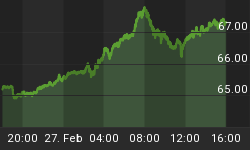With continental Europe firmly mired in vacation mode, data from the EU has been thin on the ground lately. Still, today we learned that the flash estimate of French Q2 GDP growth was on the ball - the economy did indeed slow to a mere 0.1% quarterly growth (+1.3% on the year), down from a far healthier 0.4% and 1.9% in Q1. This is weaker than the result for the Euro-zone as a whole, which saw real GDP edge up 0.3% on the quarter (+1.2% on the year). More to the point, the underlying details do not bode very well for the French economy heading into Q3.

Household consumption - long the mainstay of the economy - fell 0.3% on the quarter, down sharply from 0.8% in Q1, and business investment also dropped. About the only thing that kept French GDP growth positive at all last quarter was stock building, with the level of stocks up 0.4%. All told, it is hard to see how real GDP growth this year can hit the 2.0% forecast by the government.
We'll have to wait a couple of weeks for any more useful data releases from the Euro-zone's second largest economy - July's unemployment rate comes out on August 31, July industrial output isn't due for release until September 9, and we won't get combined July/August consumer spending data until September 21. Recent trends suggest none of these results will be very cheering.
Meanwhile, the data releases from Germany, the largest Euro-zone economy, will continue to trickle out a little more steadily. We already learned last week that Q2 GDP was flat on the quarter, after rising 0.8% in Q1. Details on Q2 GDP will be released next Tuesday, August 23, and the ZEW investors' sentiment indicator is also due that day.
On the 25th comes the closely-watched Ifo institute's business climate index. Last month's Ifo hinted that domestic demand was showing signs of a rebound. Today, the German Finance Ministry predicted that corporate investment is set to underpin domestic demand in the second half of this year, adding that tax data support signs of a pickup in domestic demand. If these signs are correct, the Ifo should continue to edge upward this month. Still, it's not likely that slightly more sanguine German consumers can make up for the slump in confidence among their French counterparts and so help overall Euro-zone growth to recover again in Q3.

Much of the outlook for Germany over the coming weeks will be affected by the election expected to be held September 18. Market expectations of a center-right victory will continue to boost sentiment; any signs of a resurgence of support for Chancellor Schroeder's Social Democrats - or, worse, that the outcome could be too close to call - will have the opposite impact.
And where does all of this leave the euro? Thin summer trading and a dearth of major economic news make the forex market a strange place in August. For now, the US$ is benefiting from expectations of continued steady rate hikes from the Fed, and a lack of any definitive economic news out of Europe. A better gauge of the longer-term US/€ trend will have to wait until everyone is back from the beaches in September.















